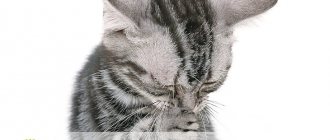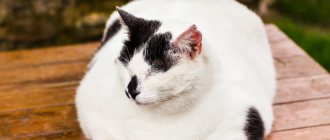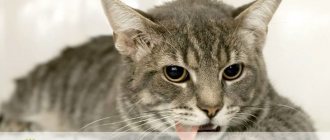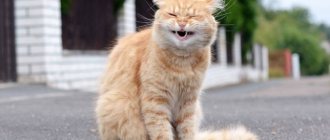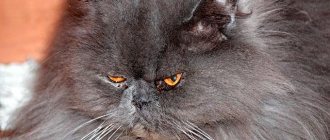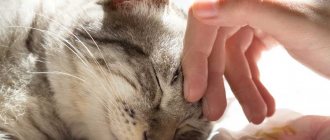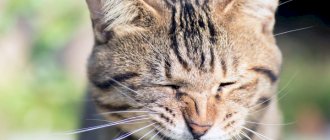- home
- Treatment
- Symptoms of cat diseases
- The cat is coughing and wheezing as if she was choking.
If your cat is coughing and wheezing and you suspect she is choking, there is a good chance you are right. Most likely, a foreign body has entered the respiratory tract or gastrointestinal tract, which is interfering, and the animal is trying to free itself from this object by coughing.
Very often the cause of cough is a hairball. When a cat washes itself and licks itself, it collects hair with its tongue, which accumulates in the stomach, forming a trisobezoar. Over time, due to the long stay in its body, inflammatory processes begin, which causes the cat considerable discomfort.
Perhaps your cat has also encountered this problem, in which case there are special means that can dissolve the lump, or induce vomiting and cleanse the intestines. After an examination, your veterinarian will be able to select the appropriate one for each specific case.
Why does a cat cough and wheeze?
Cat cough is similar to human cough, but may have a different origin. Respiratory infections are not transmitted from owner to pet and vice versa.
Asthma
A likely factor that provokes the appearance of a cough, accompanied by protruding the tongue from the mouth, and difficult breathing is an asthmatic attack. This is caused by narrowing of the bronchi and difficulty in breathing due to this. Over time, the walls of the bronchi thicken, the tissues swell and mucus is released. The cat begins to behave restlessly, tries to cough up the mucus that has formed, and spends most of the time with her neck stretched out and her head down. There may even be a loss of consciousness. The disease appears in early childhood and very soon becomes chronic.
To prescribe appropriate therapy, tests are taken and examinations are carried out. Glucocorticosteroids relieve spasms, and antibiotics treat inflammation. To relieve asthmatic attacks, it is advisable to purchase an inhaler.
Cough in cats
Allergy
Most often it appears on pollen, but it can also appear on foods eaten. If it is confirmed, the veterinarian will prescribe medications that reduce or completely eliminate the problem.
Foreign object
Curiosity leads to swallowing various objects. Most often, small kittens suffer from this. There is no need to try to remove it yourself to avoid causing damage. You need to go to the vet urgently.
Main reasons
You can understand the reason why a cat wheezes and coughs, and whether this symptom should be treated or not, if you correctly assess the condition of the pet. It is necessary to pay attention to the presence or absence of accompanying symptoms, record the duration of attacks and the time of day at which they most often occur.
Cough is a companion to many diseases. In cats, as a rule, it does not act as an independent disease, but manifests itself as a symptom of some ailment:
- If you had to observe how an animal stretches its neck, coughs heavily and at the same time breathes heavily, then we can talk about asthma. Most often it affects animals older than two years. At first the attacks are rare, but later they become more frequent and intensify.
- Similar symptoms can develop in case of an allergic reaction to dust or odors of human food. In this case, the pet sneezes and coughs a lot. You should not self-medicate. It is better to show the furry animal to a veterinarian, who will prescribe the necessary treatment.
- Pinworms and other worms, which almost every animal has, can cause painful coughing and wheezing.
- A reflex spasm can also be triggered by the entry of a foreign object into the respiratory tract. This happens when the pet's owner allows him to eat food with bones or play with small toys that the pet may accidentally swallow. In such a situation, you cannot do without urgent contact with a specialist, since an independent attempt to remove a foreign object can harm the cat.
- The kitten may choke on its own fur in its throat. This is completely harmless; subsequently, the pet will vomit the lump on its own. A similar phenomenon is most often observed in representatives of long-haired breeds.
- Pneumonia is difficult for pets and causes severe coughing. The animal's body temperature rises and vital energy noticeably decreases. Pneumonia usually results from hypothermia.
- In case of cardiovascular diseases, wheezing in the chest is observed, and treatment at home is contraindicated.
- Oncology in the respiratory tract provokes severe coughing attacks.
- Acute respiratory illness, viral or bacterial infection of the respiratory tract also causes this reflex.
There are also a large number of reasons that provoke coughing. For an accurate diagnosis, you need to contact a veterinarian.
Helminths
Worms that appear in the body irritate the mucous membrane, causing a cough. This is often accompanied by weight loss, vomiting and dandruff. To combat them, the pet is given antihelminthic medications. In severe cases, they are given again a week after the first dose. Delay can lead to problems with the liver, kidneys and even death.
Trichobezoars, coughing up hair
Cats groom themselves by licking their fur coat with their tongue. That, in turn, can enter the digestive organs. The lumps formed there provoke coughing. It doesn't pose a threat. A paste that dissolves lumps or special food will help.
To measure the temperature
Throat injuries
They also irritate the larynx. Sores and ulcers can be a sign of chlamydia, which people can become infected with.
Heart diseases
Cardiac cough gradually intensifies and is accompanied by lethargy, shortness of breath, and heavy breathing. A cardiogram will confirm this version.
Respiratory diseases
These include viral, bacterial, and fungal infections. Immediately the cough is dry and loud. On the second day, sputum separates and he becomes deaf. In addition, nasal discharge, rotting of the eyes, weakness, and increased body temperature appear.
Pneumonia
Pneumonia can develop as a result of hypothermia, characterized by a dry barking cough, wheezing, increased body temperature, weakness, and refusal to eat. It often occurs against the background of other infections. Antibiotics and mucolytic expectorants are used for treatment.
Survey
Symptoms and diagnosis
The list of symptoms is usually typical and includes the following manifestations:
- Cough - dry or wet, with sputum.
- Difficulty breathing, accompanied by extraneous sounds.
- Shortness of breath even after minor physical exertion.
- Decreased appetite.
- Lethargy, changes in behavior.
- Excessive salivation, irritation of mucous membranes.
If coughing or wheezing is caused by an infectious disease, then signs of an inflammatory process such as fever are added to the symptoms.
Diagnosis is made based on an assessment of symptoms. Its main task is to determine the cause of wheezing and coughing for further relief. After collecting anamnesis and examining the animal, the veterinarian may prescribe:
- Blood analysis.
- Stool analysis to detect lungworms.
- Analysis of tracheal swabs.
- Chest X-ray.
If it is difficult to make a diagnosis, other examinations may be performed.
How to treat
After determining the provoking factors, appropriate treatment is prescribed. Using medications without consultation with a specialist can cause negative consequences. The wrong choice of medication or its dosage can lead to complications. However, it is very useful to familiarize yourself with general information about existing drugs. In some cases, you can use tablets intended for humans. It is not recommended to give syrups due to the large amount of sugar, dyes, and flavors they contain. Medicines containing codeine and alcohol are also not allowed.
Blocking substances help to quickly eliminate attacks, but do not affect its source. Therefore, they can be given to your pet only in combination with other means. Expectorants do an excellent job of treating infectious coughs by thinning mucus and removing it from the respiratory tract.
How to treat a cough
Prevention
It is possible to prevent coughing in an animal if you plan to vaccinate your cat against viral diseases. It is possible to reduce the likelihood of an unpleasant symptom by regular deworming and eliminating parasites from the skin that can carry parasitic worms. It is necessary to feed the cat properly so that its immunity does not weaken. It is not recommended to give your pet solid food, large pieces, especially bones, on which he can choke. Coughing is less likely to occur in cats that live in warm conditions and receive adequate care.
Symptoms depending on the type of cough
If your cat starts coughing, it is important to take a closer look at how he does it and what other symptoms are present. This is necessary to later describe the condition to the veterinarian.
Foreign body
One of the reasons why a cat coughs as if choking is when some object gets into the airways. The cough then appears suddenly, suffocating, lasts constantly, always with shortness of breath. If a foreign body ends up in the pharynx or esophagus, the cat coughs regularly with attacks. At the same time, it is painful for the animal to swallow, drooling, and nausea.
Respiratory cough
Respiratory tract infections (rhinotracheitis, calcivirosis, mycoplasmosis, bordetellosis) are a common reason why a cat coughs.
Infections generally manifest themselves as cold symptoms:
- cough is acute, often dry;
- sneezing (sometimes a wet cough that sounds like a sneeze);
- lacrimation;
- purulent discharge from the nose;
- conjunctivitis;
- runny nose;
- increased body temperature;
- ulcers may appear in the mouth.
In cats, especially kittens under one year of age, rhinotracheitis is one of the main causes of cough.
The next most common cause is bronchitis.
With bronchitis, as well as pneumonia, from the first days of illness the cat is weak and eats poorly. A cough appears on day 2-3. At first it is dry and deep, but over time it becomes moist and dull. It can be both rare and paroxysmal. Snot appears. At first transparent, then white or greenish.
Bronchitis and pneumonia are also accompanied by other symptoms:
- Increased temperature (hyperthermia), in severe cases, on the contrary, the temperature is reduced.
- Complete lack of appetite.
- Difficulty breathing, both when inhaling and exhaling.
- Oppression.
In chronic bronchitis, a severe cough appears when the animal gets up from a lying position.
It is not uncommon for a cat with chronic bronchitis to develop pneumofibrosis, a disease in which scarring forms on the lungs and makes it difficult for the animal to breathe. The cough is dry. It may manifest itself rarely or regularly, but with a single cough.
Laryngitis and tonsillitis
Laryngitis is an inflammation of the laryngeal mucosa, which can be caused by rhinotracheitis, calicivirus, but also be a consequence of injury, laryngeal tumor, or paralysis. The disease is accompanied by a cough, first dry, then with sputum discharge.
In acute laryngitis, a cat's cough is especially painful. The pet may shake its head, stretch its neck, moan, and make swallowing or chewing movements. The voice changes - it becomes hoarse, and the meow may be lost. Acute laryngitis lasts 1-1.5 weeks. If treated incorrectly, it can become chronic with regular attacks of exacerbation.
Tonsillitis is inflammation of the tonsils or tonsillitis. The disease in its acute form is manifested by drooling, lethargy, and fever. The cat has difficulty swallowing, so it refuses to eat or has difficulty eating and drinking. Meows hoarsely, abruptly, coughs.
Asthmatic cough
Feline asthma in its manifestations is similar to how a person is sick. Asthmatic syndrome is characterized by a prolonged cough with suffocation. During the rest period, coughing is rare, but coughing attacks occur suddenly. The cat is breathing heavily and wheezing is heard when breathing. During an asthma attack, the mouth is open, the tongue shows signs of cyanosis, the pupils are dilated, trembling, the animal seems to be suffocating. Over time, the pet becomes lethargic, apathetic, and is in a state of constant drowsiness.
Symptoms accompanying coughing attacks in a cat
It is easy to determine that a pet is having a coughing attack - the cat presses itself to the floor, arches its back, stretches its neck and retracts its abdominal wall, while simultaneously lowering its head.
After this, the cat’s mouth opens slightly and characteristic sounds are heard. From the outside it looks like she was choking on something. The process may be accompanied by wheezing, gagging and vomiting.
As we have already written, cats are a species that can suppress the cough reflex. Sometimes complex manipulations with body movements help them, and the attack stops.
There are several indirect symptoms that indicate that your cat may be having a coughing fit:
- Snoring or loud snoring accompanies airway congestion. Healthy cats don't snore!
- Wheezing. These sounds appear while you are awake. The cat often wheezes while eating when he tries to swallow it.
- Loss of appetite and weight. If the airways or esophagus are severely irritated, the animal will try to avoid eating. Over time, these symptoms are accompanied by lethargy.
Be attentive to your pets; a cough noticed in time is a guarantee of quick and high-quality treatment.
In what cases should you urgently consult a doctor?
A doctor should be consulted in all cases of coughing in a cat, especially if the cause is unknown. Cough is a symptom of a large number of diseases, and to cure it it is important to correctly determine the cause of the disease. The appearance of a cough may indicate the onset of an infectious disease, as well as decompensation of the course of a chronic disease; therefore a visit to the veterinarian is necessary. When visiting a veterinarian, it is important to correctly describe the nature of your cat's cough; You should not give antitussive drugs to your animal yourself, as this will make it difficult to make a correct diagnosis.
If a cough appears, a visit to the veterinarian is mandatory - since there are a lot of diseases that accompany coughing
Treatment of cough at home
At home, the owner can help his pet only in two cases:
- it is possible to remove the foreign body;
- the cat inhaled gases or smoke.
In the latter case, the most important thing is to eliminate the effect of irritants and ensure a flow of fresh air. To do this, either take the pet outside or place it in a well-ventilated area.
If there are other accompanying symptoms, you cannot treat them at home or give your cat medications. Firstly, it can make the situation worse. Secondly, it will blur the overall picture and complicate the doctor’s task of making a diagnosis.

